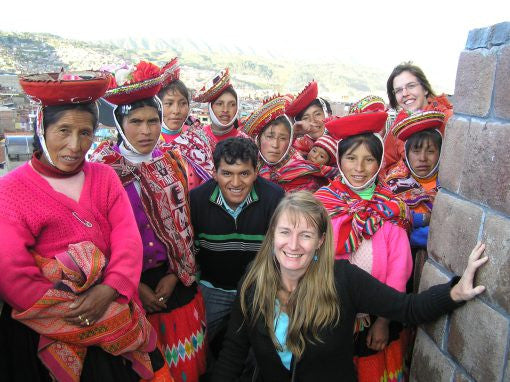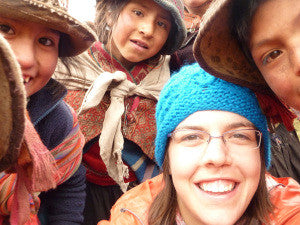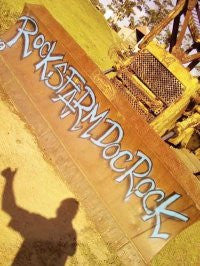
Blog author Ariana Svenson, with Threads of Peru Community Liasion Officer Urbano Huayna, volunteer Calina Ellwand and the women of the communities on top of the statue of Inca Pachacutec.
“Leadership” is a word that gets thrown around in development circles with frequency.
But what does it actually mean? In simple terms, my definition is showing by example and motivating others tow ards the same goal.
Last year, when working in the communities we had identified that it was hard to get the women coordinated or advancing in their work because there was a leadership vacuum. But then, what should we expect from largely illiterate women who exist in a completely different cultural paradigm than ourselves?
In March, we spent considerable time talking to the associations about the responsibilities of committees (i.e. what were the roles of the President, Secretary etc) and then the three communities elected new committees. As part of their training we decided to take the women to Cusco to expose them to new ideas – to inspire them to take on more responsibility. A few of them had only been to Cusco once in their lives! The women´s “Leadership program” took place on the 11th and 12th of April and we kicked off the program by a visit to the health post in Yanahuara. In total we had 10 women, representing the three communities, and three babies.
 Threads of Peru is aware that there are a great deal of resources available to the remote living mountain people but for feelings of discrimination and isolation they don´t take advantage of these government services. So our first visit was to say to the women, “we support that you utilize the health post and take
Threads of Peru is aware that there are a great deal of resources available to the remote living mountain people but for feelings of discrimination and isolation they don´t take advantage of these government services. So our first visit was to say to the women, “we support that you utilize the health post and take
 your children for regular controls.” Not a mind-blowing “leadership” training but the kinds of messages we want the women to take back to the communities.
your children for regular controls.” Not a mind-blowing “leadership” training but the kinds of messages we want the women to take back to the communities.
As we headed up to the famous weaving village of Chincheros we were reminded that riding in cars make the women motion sick, and you should always have a good supply of lemons, alcohol and motion sickness tablets on hand!!!
 Even though I´ve been working with the women for nearly 4 years now, I am constantly frustrated as it’s hard to communicate or get their opinion about things. These two days in Cusco changed things tremendously – opinions came flying through our translator Urbano thick and fast – and we had shy requests for visits to different places. The meeting we had in the evening was the most productive we had ever had! Was it that they were out of their communities (and they normally feel silenced in their communities), or were they simply inspired!
Even though I´ve been working with the women for nearly 4 years now, I am constantly frustrated as it’s hard to communicate or get their opinion about things. These two days in Cusco changed things tremendously – opinions came flying through our translator Urbano thick and fast – and we had shy requests for visits to different places. The meeting we had in the evening was the most productive we had ever had! Was it that they were out of their communities (and they normally feel silenced in their communities), or were they simply inspired!
 We left them to their own devices during the evening, with suggestions to go to a chicken restaurant and make a few “touristy” visits. The next morning they shyly admitted that they were too scared to visit the Plaza de Armas during the evening.
We left them to their own devices during the evening, with suggestions to go to a chicken restaurant and make a few “touristy” visits. The next morning they shyly admitted that they were too scared to visit the Plaza de Armas during the evening.
Our second day was the day devoted to learning more about weaving, with visits to the CTTC (Centro de Textiles Tradicionales) and the store Manos Campesinos (in Casa Campesina). Based on what we learned on these superficial visits, we are planning another capacitacion later in the year with weavers from some of these cooperatives to really begin the nuts and bolts training of how to organize an association.
Two full days and volunteer Calina and I were exhausted, as were the women who headed home with mantas full of supplies, new actas (record books), and official stamps for their associations. And most of all… inspired to take more responsibility in their communities.








 The trip to the villages exposed me to the many challenges of doing development work in remote locations. This creates difficulties for communication, transportation of services and supplies and, generally, makes any development work more arduous and expensive. Activities that require regular and frequent community visits are impossible without considerable resources. The best solution I can think of is to ensure that all development activities and programs are self-sustainable and can continue without much participation from Threads of Peru. However, I quickly understood that getting to this point takes a long-term commitment and involvement from the organization.
The trip to the villages exposed me to the many challenges of doing development work in remote locations. This creates difficulties for communication, transportation of services and supplies and, generally, makes any development work more arduous and expensive. Activities that require regular and frequent community visits are impossible without considerable resources. The best solution I can think of is to ensure that all development activities and programs are self-sustainable and can continue without much participation from Threads of Peru. However, I quickly understood that getting to this point takes a long-term commitment and involvement from the organization.
 In 2009 they raised over $10,000 for two charities and in 2010 they are hoping to top that figure... and donate some of it to Threads of Peru!!! Rocksfarm Doc Rock will be held on Saturday 17th April 2010 featuring 43 Cambridge, Billy, Ross & Dougie, Chloe Quinn-Schofield, Xave Brown... and many more!!! www.rocksfarm.com.au
In 2009 they raised over $10,000 for two charities and in 2010 they are hoping to top that figure... and donate some of it to Threads of Peru!!! Rocksfarm Doc Rock will be held on Saturday 17th April 2010 featuring 43 Cambridge, Billy, Ross & Dougie, Chloe Quinn-Schofield, Xave Brown... and many more!!! www.rocksfarm.com.au